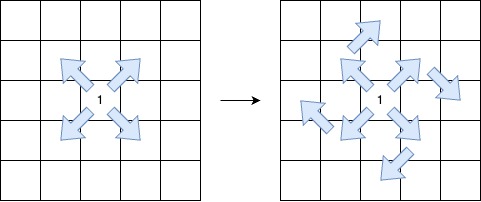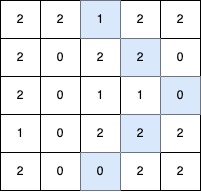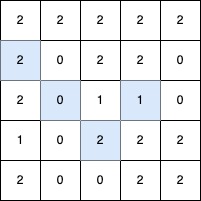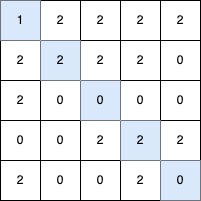LeetCode每日一题-2025-8-27-LC3459.最长 V 形对角线段的长度
2025-08-27-LeetCode 每日一题 -3459.最长 V 形对角线段的长度
给你一个大小为 n x m 的二维整数矩阵 grid,其中每个元素的值为 0、1 或 2。
V 形对角线段 定义如下:
- 线段从
1开始。 - 后续元素按照以下无限序列的模式排列:
2, 0, 2, 0, ...。 - 该线段:
- 起始于某个对角方向(左上到右下、右下到左上、右上到左下或左下到右上)。
- 沿着相同的对角方向继续,保持 序列模式 。
- 在保持 序列模式 的前提下,最多允许 一次顺时针 90 度转向 另一个对角方向。

示例 1:
输入: grid = [[2,2,1,2,2],[2,0,2,2,0],[2,0,1,1,0],[1,0,2,2,2],[2,0,0,2,2]]
输出: 5
解释:

最长的 V 形对角线段长度为 5,路径如下:(0,2) → (1,3) → (2,4),在 (2,4) 处进行 顺时针 90 度转向 ,继续路径为 (3,3) → (4,2)。
示例 2:
输入: grid = [[2,2,2,2,2],[2,0,2,2,0],[2,0,1,1,0],[1,0,2,2,2],[2,0,0,2,2]]
输出: 4
解释:

最长的 V 形对角线段长度为 4,路径如下:(2,3) → (3,2),在 (3,2) 处进行 顺时针 90 度转向 ,继续路径为 (2,1) → (1,0)。
示例 3:
输入: grid = [[1,2,2,2,2],[2,2,2,2,0],[2,0,0,0,0],[0,0,2,2,2],[2,0,0,2,0]]
输出: 5
解释:

最长的 V 形对角线段长度为 5,路径如下:(0,0) → (1,1) → (2,2) → (3,3) → (4,4)。
示例 4:
输入: grid = [[1]]
输出: 1
解释:
最长的 V 形对角线段长度为 1,路径如下:(0,0)。
提示:
n == grid.lengthm == grid[i].length1 <= n, m <= 500grid[i][j]的值为0、1或2。
思路
记忆化搜索
\(dp[x][y][pos][flag]\)
\(pos\):
1 左下到右上
2 右下到左上
3 右上到左下
4 左上到右下
\(flag\)
0尚未转向
1已经转向
那么dp数组的含义就是在位置(x, y)时,朝向是pos时,已经/尚未转向时能走的最长距离
需要注意的点:
-
- 从1开始
-
- 2和0交替,所以需要记录上一位走的是什么
-
- 及时剪枝
当flag == 1一直朝着当前的方向走下去就行
if (pos == 1) return dp[x][y][pos][flag] = 1 + search(search, x - 1, y + 1, 1, flag, nxt);
if (pos == 2) return dp[x][y][pos][flag] = 1 + search(search, x - 1, y - 1, 2, flag, nxt);
if (pos == 3) return dp[x][y][pos][flag] = 1 + search(search, x + 1, y - 1, 3, flag, nxt);
if (pos == 4) return dp[x][y][pos][flag] = 1 + search(search, x + 1, y + 1, 4, flag, nxt);
当flag == 0要么朝着当前方向走,要么转方向
int dx = 0, dy = 0, npos = 0;
if (pos == 1) dx = -1, dy = 1, npos = 4;
if (pos == 2) dx = -1, dy = -1, npos = 1;
if (pos == 3) dx = 1, dy = -1, npos = 2;
if (pos == 4) dx = 1, dy = 1, npos = 3;
int nx = dx + x, ny = dy + y;
// 要么继续走,要么转方向
return dp[x][y][pos][flag] = std::max(search(search, nx, ny, pos, flag, nxt) + 1, search(search, x, y, npos, 1, lst));
代码
const int dir[4][2] = {{-1, 0}, {1, 0}, {0, 1}, {0, -1}};
class Solution {
public:
int lenOfVDiagonal(std::vector<std::vector<int>>& grid)
{
int n = grid.size(), m = grid[0].size();
std::vector<std::vector<int>> mat(n + 1, std::vector<int>(m + 1, -1));
for (int i = 1; i <= n; i++) for (int j = 1; j <= m; j++) mat[i][j] = grid[i - 1][j - 1];
int dp[501][501][5][2] = {0};
// 1 左下到右上
// 2 右下到左上
// 3 右上到左下
// 4 左上到右下
auto check = [&](int tx, int ty) -> bool
{
return (tx <= n && tx >= 1 && ty <= m && ty >= 1);
};
auto search = [&](auto&& search, int x, int y, int pos, int flag, int lst) -> int
{
int nxt = 0;
if (lst == 0) nxt = 2;if (!check(x, y)) return 0;
if (mat[x][y] != nxt) return 0;
if(dp[x][y][pos][flag]) return dp[x][y][pos][flag];
if (flag)
{
if (pos == 1) return dp[x][y][pos][flag] = 1 + search(search, x - 1, y + 1, 1, flag, nxt);
if (pos == 2) return dp[x][y][pos][flag] = 1 + search(search, x - 1, y - 1, 2, flag, nxt);
if (pos == 3) return dp[x][y][pos][flag] = 1 + search(search, x + 1, y - 1, 3, flag, nxt);
if (pos == 4) return dp[x][y][pos][flag] = 1 + search(search, x + 1, y + 1, 4, flag, nxt);
}
else
{
int dx = 0, dy = 0, npos = 0;
if (pos == 1) dx = -1, dy = 1, npos = 4;
if (pos == 2) dx = -1, dy = -1, npos = 1;
if (pos == 3) dx = 1, dy = -1, npos = 2;
if (pos == 4) dx = 1, dy = 1, npos = 3;
int nx = dx + x, ny = dy + y;
// 要么继续走,要么转方向
return dp[x][y][pos][flag] = std::max(search(search, nx, ny, pos, flag, nxt) + 1, search(search, x, y, npos, 1, lst));
}
return 0;
};
int ans = 0;
for (int i = 1; i <= n; i++) for (int j = 1; j <= m; j++) if (mat[i][j] == 1)
{
ans = std::max(1, ans);
if (check(i - 1, j - 1) && mat[i - 1][j - 1] == 2) ans = std::max(ans, 1 + search(search, i - 1, j - 1, 2, 0, 0));
if (check(i + 1, j + 1) && mat[i + 1][j + 1] == 2) ans = std::max(ans, 1 + search(search, i + 1, j + 1, 4, 0, 0));
if (check(i - 1, j + 1) && mat[i - 1][j + 1] == 2) ans = std::max(ans, 1 + search(search, i - 1, j + 1, 1, 0, 0));
if (check(i + 1, j - 1) && mat[i + 1][j - 1] == 2) ans = std::max(ans, 1 + search(search, i + 1, j - 1, 3, 0, 0));
}
return ans;
// std::cout << search(search, 4, 3, 3, 0, 0) << '\n';
}
};


 浙公网安备 33010602011771号
浙公网安备 33010602011771号